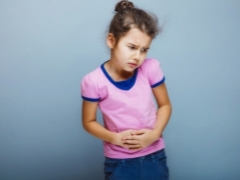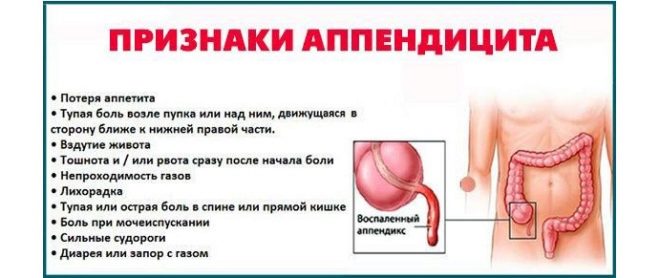Acute appendicitis in children
Every child can get sick with acute appendicitis. The most common children of early school age. Inflammation of the appendix is quite a dangerous disease. Delay in the provision of skilled medical care can lead to dangerous complications (and even death).
Symptoms in young children
Appendicitis in toddlers may occur in different ways. Often the first symptoms occur under the guise of a cold or flu. The child feels bad, he is very weak, refuses to eat. Kids become very naughty, do not play with toys. Habitual favorite activities no longer bring them joy and satisfaction.
One of the first symptoms of appendicitis are the following:
- Increased body temperature. In most cases, the temperature does not exceed 37-37.5 degrees. However, with severe disease or weakened babies, the temperature can rise to even 38-39 degrees. The higher the temperature, the more unfavorable the course of the disease becomes.
- Weakness, decreased mood and appetite, may cause headaches. All these symptoms are due to severe dehydration and inflammation. They occur in inflammation of the appendix of the caecum (appendix). Toddlers become more sleepy, may cry or sob.
- Abdominal pain. Classically, with appendicitis, pain is localized in the right side of the abdomen. However, this is not always the absolute diagnostic sign of the disease. In a small number of cases, the appendix can be located in the left half of the abdomen, as well as in the navel (or even under the right costal arch). Very rarely, the vermiform process is located in the groin.
- Moderate pain intensity. Small children can have a spastic variant of the course of the disease. In this case, the pain is getting worse, then it calms down for a while. The child at this time trying to spare the tummy. Any touch to the baby's tummy can cause him increased pain.
- Children up to three years old may have vomiting during pain or fever. However, this symptom does not always occur. For older children, persistent nausea is common.
- Disruption of the chair does not develop in all cases. This is more common in younger children. There is more liquid stool than constipation.
- Manifestations of dehydration. These include severe thirst, dry lips and visible mucous membranes, as well as dry skin. If such symptoms appear, an emergency medical team should be called in urgently. In this case, emergency hospitalization in a surgical hospital is already required.
Features of the flow
Acute appendicitis in children does not occur as in adults, but in a completely different scenario. Even to suspect the disease in a child is sometimes much more difficult. This is due to the peculiarity of the structure and functioning of the organs of the gastrointestinal tract.
The causes of the disease in children can be various external factors. The most common cause is mechanical obstruction of the cecum. This can lead to helminthic invasion, foreign objects getting into the stomach and intestines, as well as various bacteria that cause inflammation.
In most situations, acute appendicitis develops after hitting an abundant amount of untreated coarse fiber.This may be the case if the child has eaten a large amount of fruit with a skin or swallowed some fruit along with a bone. Remove any bones from fruits and berries before giving it to a child.
Experts note that most often appendicitis occurs in children older than 7 years. Infants do not suffer from this disease. Quite often appendicitis occurs in adolescence. In children older than 12-13 years, the disease proceeds according to the same scenarios as in adults.
During illness in children, symptoms of intoxication and dehydration may prevail. This is due to the imperfection of the structure of the immune and excretory systems of the child’s body. The development of complications associated with the onset of dehydration is also quite common in children.
Acute appendicitis is quite pronounced and has pronounced clinical symptoms. If you do not start the right treatment in time and do not perform a surgical operation, you can cause irreparable harm to the children's body and even put the baby’s life at great risk.
Differential diagnostics
To diagnose any surgical pathology is quite difficult. The fact is that many diseases in their development may have similar clinical symptoms or manifestations. To tell exactly what kind of disease arose, doctors conduct additional laboratory tests and research.
When a child is hospitalized in a surgical hospital, they will take blood from him for analysis. It shows whether there is an inflammatory process in the body, and also allows you to understand what is the possible cause of the disease. According to a blood test, a doctor can most likely tell whether a specific inflammatory process is caused by a bacterial or viral infection. Blood tests will show how dangerous and difficult the disease is in a baby.
If the diagnosis is difficult to establish, additional diagnostic methods may be required. One of the fastest and most informative methods for determining the presence of acute appendicitis is an ultrasound examination of the abdominal organs. The diagnostician will be able to give a description to all the organs of the gastrointestinal tract and clarify whether there is inflammation in the appendix.
Acute appendicitis must be distinguished from all exacerbations of chronic diseases of the digestive system. For adolescent girls, the location of the appendix of the cecum in the pelvis often requires differential diagnosis (diseases of the uterus, ovaries and appendages). Here gynecologists already come to the aid of surgeons.
In very rare cases, when the appendix is located in the umbilical area, it is necessary to carry out a differential diagnosis (exacerbation of chronic gastritis).
Exacerbations of chronic pancreatitis or acute cholecystitis can give similar symptoms. In any case, the final diagnosis can only be made by the surgeon, after all the necessary additional tests and research have been carried out.
Clinical recommendations in the treatment
Suspecting the baby for signs of acute appendicitis, parents should urgently call an ambulance. In such a situation requires hospitalization of the baby in the surgical department.
In the very near future, after all the tests are performed, an appendix removal surgery is required. The operation is not complicated. If the surgeon has sufficient clinical experience, you should not be afraid of the operation. Every day, children with acute appendicitis come to the departments of emergency pediatric surgery.
If the baby’s disease is severe and there are pronounced the symptoms intoxication, in the very near hours after the arrival of the baby in the hospital, an emergency operation is performed. In this case, the operation is aimed primarily at keeping the baby alive.
With the development of shock, when the baby is unconscious, an emergency operation is also required, but with a preliminary restoration of the child’s condition. In this case, resuscitators are involved in the work of surgeons.
After the operation, the baby remains in the surgical hospital for some time. This is necessary so that the doctor, while observing the state of the child, does not miss the dangerous complications during the postoperative period.
For about two weeks, the children's body will recover after the operation. If the child at the time of admission to the hospital had signs of shock or developed peritonitis, the stay in the hospital may take a longer time.
The entire rehabilitation period for the baby will be watched by doctors. After discharge from the surgical department, the baby will be observed at the dispensary registration with the surgeon for half a year. The doctor will monitor the condition of the suture, and will also give recommendations on how to prevent the appearance of a hernia.
After discharge from the hospital within a month, any physical activity is limited. Raising heavy objects is strictly prohibited. This can trigger the onset of various complications.
Treatment of acute appendicitis should be carried out only in a surgical hospital. With timely surgery, you can not worry about the life of the baby. This disease will be completely cured.
Recall another topic that worries many parents whose children have undergone an appendix removal operation. This is the nutrition of children after this operation. Recommendations specialists in the detailed video.
Apendicitis - this is the diagnosis that became the topic of one of the popular programs with Elena Malysheva.






















